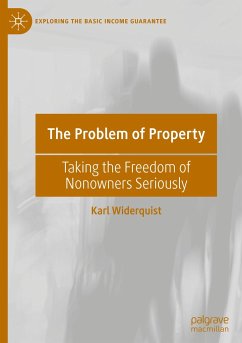This book is Karl Widerquist's first statement of the "indepentarian" theory of property, called, "Justice as the Pursuit of Accord" (JPA). It argues the natural-rights-based arguments for unequal private property have failed to establish that institution as right. It is a legal privilege, inconsistent with the maximum equal freedom from interference. The book discusses how to establish and maintain a property system that best promotes freedom from interference. Paying taxes and obeying regulations is part of the purchase price of the right to control, use, or use-up any good made partly out of natural resources (i.e. all goods), because doing so interferes with people who control, use, or use-up fewer natural resources. A sufficient portion of that tax revenue has to be redistributed in the form of a Universal Basic Income to ensure the property system is in the interest of everyone.
Bitte wählen Sie Ihr Anliegen aus.
Rechnungen
Retourenschein anfordern
Bestellstatus
Storno









